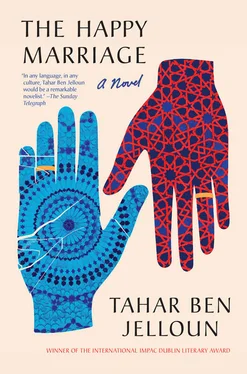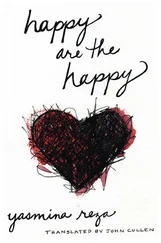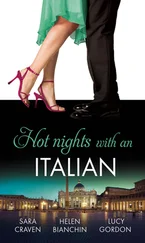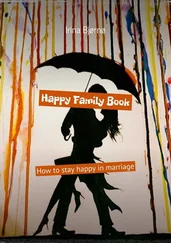When he was a child, his father used to urge him to visit the sick and the dying. “This is what our Prophet counsels us to do,” he would say, “we must visit those who suffer and who are waiting for their appointed hour, which is slow in coming. Visiting a dying man allows you to be both selfish and generous. Giving up your time to visit a man who is nailed to his bed is a good way to learn humility, to learn that it’s the little things that really make a difference in life, and that we are but grains of sand who belong to God, to whom we will return! Those who are afraid of other people’s illnesses must overcome that dread and learn to familiarize themselves with what lies ahead for all of us. There you have it, my son. These may be platitudes, but they have a kernel of truth!”
At the clinic where he’d been hospitalized following his stroke, the painter had shared a room with a twenty-seven-year-old Italian pianist called Ricardo. Ricardo had also suffered a stroke while holidaying in Morocco. His doctors and his family had been waiting for his condition to improve slightly before sending him back to Milan. Ever since he’d regained consciousness, Ricardo had kept staring at his hands. He could no longer move his fingers! And thus wept in silence. His tears flowed incessantly. As though nothing could stop them, he would shut his eyes and turn his head to face the wall. His life had fallen apart and his career cut brutally short. A woman, perhaps his wife or his friend, would spend each day at his bedside, comforting him. She would rub his fingers, caress his face, dry his tears, and then leave the room, devastated. She would leave the clinic to smoke a cigarette then return, looking sad. The woman had once sat on the painter’s bed and started talking to him. He had listened to her and nodded his head.
“Ricardo is the love of my life, he had an incredibly bright future ahead of him, but his enemies won in the end. I’m Sicilian and I believe in the evil eye, it’s no coincidence that jinns are almost always cruelly beaten. Jealousy, envy, and malice. I’ve been told that people in Morocco believe in the evil eye. It exists and I have the proof. Ricardo and I were planning to get married a month after our trip to Morocco. His parents had been against the match — you see, as they belonged to the Milanese upper classes they could hardly stand by and watch their only son marry a fisherman’s daughter from Mazara del Vallo! But we had a plan, we’d had the idea to move to the United States as soon as we’d married, where his agent had told him he would always be in demand. And then the day after we arrived in Casablanca, he collapsed in our hotel room. I don’t know what happened. I knew that he’d often told me about how stressed he was, about the perfectionism that he wanted to achieve, an ambition that gnawed away at him, he couldn’t tolerate the slightest mistake or oversight. He would become ill before a concert, he wouldn’t eat or speak to anyone, I could feel him twisting himself into knots, as anxious as a bullfighter entering the arena. What will become of us? Please forgive me, here I am talking to you and I don’t even know you … I haven’t even asked you what your name is and what you did before your stroke … I’m just so upset!”
He had tried to mouth some words. She had understood that he was in just as bad shape as Ricardo. An artist struck by the same misfortune, the inability to practice his art. She had lowered her gaze and tears had streamed down her cheeks.
He had observed her, without her knowing it, admiring her wild beauty: a Southern girl, dark, tall, elegant, and lacking in manners. “What a waste!” he told himself. Life had been truly unfair!
Ricardo left the clinic a few days later and was sent back to Italy. As she’d been preparing to leave, the girl had scribbled a few words on the back of a prescription that she’d left on top of the painter’s bedside table, and then planted a small kiss on his forehead. She had written down their address and phone number along with a little message of hope where she wished they could meet again one day and sit around a table in Sicily or Tuscany. She had signed it “Chiara.”
His new condition as an invalid reminded him of his visits to Naima, a cousin whom he’d loved like a sister, who’d been struck down by Lou Gehrig’s disease at the age of thirty-two. He had watched the disease evolve, and witnessed her body’s slow but inexorable deterioration, which was gradually losing its muscle mass. He’d greatly admired that young beautiful woman who was confined to a wheelchair and yet was still so brave and optimistic. She couldn’t speak and was completely reliant on her nurse: a fearless lady who was so devoted to Naima that she never left her side, who not only considered herself a member of the family, but also an extension of her hands, arms, and legs.
He knew that amyotrophic lateral sclerosis was incurable. Naima was perfectly aware of that too, and begged God every day for a little more time so she could maybe see her children complete their studies or perhaps even see her two daughters get married. She prayed and put her trust in God’s hands.
The painter wanted to emulate her example. Yet he wasn’t enough of a believer to dutifully attend to his prayers. He believed in spirituality, so every once in a while he would invoke the tender mercies of the higher power that governed the universe. He was a skeptic who was inclined to explore the ways of the soul. An artist could not work with certainties. His entire being and body of work were plagued by a sense of doubt.
During one of the first nights he’d spent in the studio, he’d suddenly suffered a severe cramp and the urgent need to change his position in bed. But the bell hadn’t worked. However much he had tried to make his thin, reedy voice audible, however many times he tapped on the bed’s handrail, it had been to no avail. The Twins, who’d been sleeping in the next room, hadn’t heard him. He’d been in pain, the entire left side of his body had twitched and then stiffened. A final effort to move his body had caused him to abruptly fall off the side. The noise he’d made during the fall had been so loud that it had awakened the two men, who’d rushed to his side. Luckily, he hadn’t broken anything in the fall, and was unscathed aside from a few bluish bruises on his hip. Once more, his thoughts had turned to Naima, and to the terrible nights she must have endured.
Naima’s illness had radically altered his outlook on the world of disabled people. He knew more about it than most of his friends. Every time he’d crossed paths with someone who was disabled, he had tried to visualize what their daily life must have been like. He would give them a great deal of attention and take an interest in their case. Good health, both physical and psychological, always conceals reality; it prevents us from seeing the vulnerabilities of others, the occasionally cavernous wounds of those who are struck down by fate. We simply walk past them, and while in the best of cases we feel a pang of pity, we ultimately continue on our own path.
Thus he had one day accompanied his friend Hamid to a meeting for parents of disabled children. Nabile, Hamid’s son, had been born with Down syndrome. The painter had witnessed the desperate stories of those mothers whose life was a complete struggle due to the fact that Morocco did not have any adequate facilities to take care of these children. “Afflicted by a disease nobody cares about!” as one of the psychologists present in the room had said. After the meeting, the painter had had the idea of inviting Nabile back to his studio. He’d given him a canvas and some colors. Then he’d shown him how to use them. Nabile had been happy and had spent the whole day painting. They’d left in the evening along with his paintings, which his parents had had framed and hung in the living room of their home.
Читать дальше












